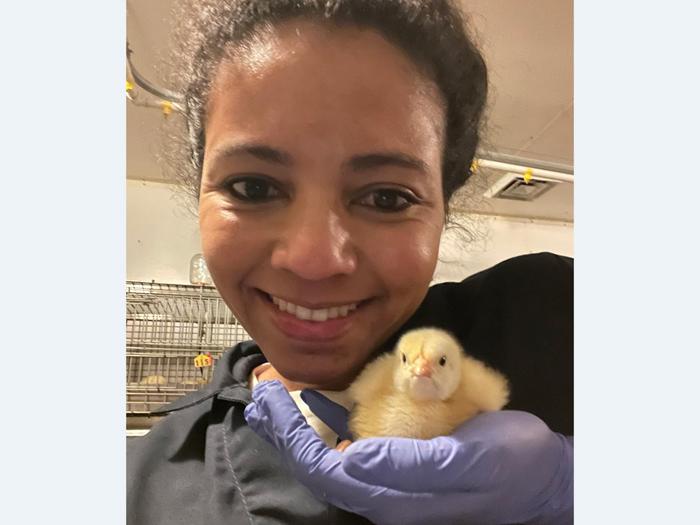UNIVERSITY PARK, Pa. — Antimicrobial resistance is an increasingly serious threat for public health, and the use of antimicrobials in livestock feed has been a major contributing factor in the emergence and spread of antimicrobial resistance to many drugs, according to the U.S. National Institutes of Health. The poultry industry is evolving toward antibiotic-free production to meet market demands and decelerate the spread, and Penn State researchers are helping to identify and better understand alternative approaches.

Credit: Penn State
UNIVERSITY PARK, Pa. — Antimicrobial resistance is an increasingly serious threat for public health, and the use of antimicrobials in livestock feed has been a major contributing factor in the emergence and spread of antimicrobial resistance to many drugs, according to the U.S. National Institutes of Health. The poultry industry is evolving toward antibiotic-free production to meet market demands and decelerate the spread, and Penn State researchers are helping to identify and better understand alternative approaches.
The growing need for antibiotic-free products has challenged producers to decrease or completely stop using antimicrobials as feed supplements in the diet of broiler chickens to improve feed efficiency, growth rate and intestinal health. Led by Erika Ganda, assistant professor of food animal microbiomes, a Penn State research team conducted a study of natural feed additives that are promising alternatives to substitute for antimicrobial growth promoters.
In findings available online now that will be published in the May issue of Poultry Science, the researchers characterized the effects of a probiotic and a blend of essential oils on broilers’ growth and gut health. The team found that supplementing the diet of young chicks with a probiotic over 21 days significantly boosted the abundance of beneficial intestinal microorganisms.
Overall, according to Ganda, research like the work her team conducted is urgently needed to help producers make decisions at the farm. However, she added, the use of these feed additives in broiler production is still in its early stages, and more studies to evaluate the health outcomes, mechanisms and consequences for antimicrobial resistance prevalence will be necessary to better understand the role of feeding antimicrobial growth promoters alternatives on the gastrointestinal tract of broilers.
“Because the elimination of antimicrobial growth promoters use is associated with increases in disease and a decrease in growth performance in chicks, antibiotic-free alternative approaches to enhance intestinal health and improve growth performance are of great interest to the poultry industry,” she said. “The claim that a product is ‘natural’ does not make it necessarily more beneficial than antibiotics, so we conducted this experiment to answer this question.”
In the research, spearheaded by Ana Fonseca, graduate assistant in Ganda’s research group in the College of Agricultural Sciences, a total of 320 one-day-old chicks were raised for 21 days in 32 randomly allocated cages. Treatments consisted of four experimental diets: a standard diet; and a standard diet mixed with the antibiotic bacitracin methylene disalicylate, or an essential oils blend of oregano oil, rosemary and red pepper, or the probiotic Bacillus subtilis.
Probiotics are live microorganisms that, when administered in adequate amounts, confer a health benefit on the host by supporting a more diverse population of beneficial bacteria in the digestive tract. Essential oils are plant-derived extracts that possess various antioxidant, immune-modulating, antimicrobial properties and the ability to change the “microbiome” — in this case, the community of microorganisms living in the chicks’ intestines.
The researchers individually weighed all broiler chickens on day one and then at the end of each dietary phase on day 10 and day 21. The feed consumed per pen was monitored at the end of each growth phase. The team also calculated the daily body weight gain average, feed intake and feed conversion ratio of feed consumed divided by weight gain at three periods: the starter phase of one to 10 days, the grower phase of 11 to 21days and the total period of one to 21 days.
The team collected excreta samples daily during the entire experimental period and analyzed DNA to identify bacteria present. Across all time points, supplementing chicken diets with the probiotic or the antibiotic significantly changed the relative abundance of bacterial strains compared to the standard diet, Fonseca noted. However, there were no microorganisms affected by essential oils compared to the standard diet.
“We were somewhat surprised by the results of the essential oils — we were expecting them not only to have some effects on the microbiome, but also on the performance side,” she said. “We still think essential oils may present a promising alternative to antimicrobial growth promoters, but their effectiveness can be influenced by various factors. We only observed these animals for 21 days, and maybe the essential oils would have more significant effects when they are older, and their microbiome gets more stable. The benefits of essential oils in this context deserves more research.”
Contributing to the research at Penn State were Sophia Kenney, graduate research assistant in molecular, cellular and integrative biosciences doctoral program; Emily Van Syoc, postdoctoral scholar, Penn State One Health Microbiome Center; Stephanie Bierly, former laboratory technician in the Ganda lab, now account manager at Novogene; Francisco Dini-Andreote, assistant professor of phytobiomes; Justin Silverman, assistant professor of information science and technology, statistics and medicine; and John Boney, Vernon E. Norris Faculty Fellow of Poultry Nutrition.
The U.S. Department of Agriculture’s National Institute of Food and Agriculture and the Penn State College of Agricultural Sciences Strategic Networks and Initiatives Program supported this research.
Journal
Poultry Science
DOI
10.1016/j.psj.2024.103604
Method of Research
Experimental study
Subject of Research
Animals
Article Title
Investigating antibiotic free feed additives for growth promotion in poultry: effects on performance and microbiota
Article Publication Date
14-Mar-2024




